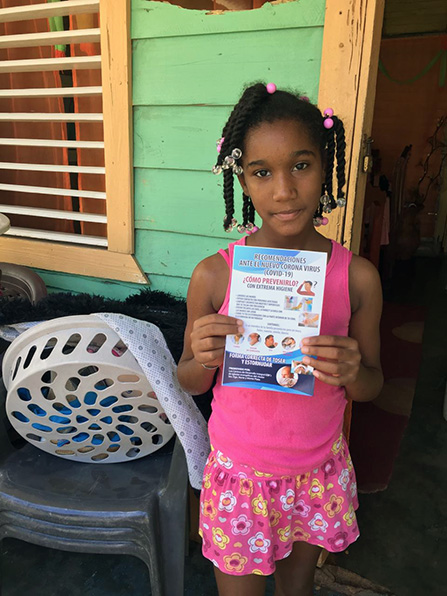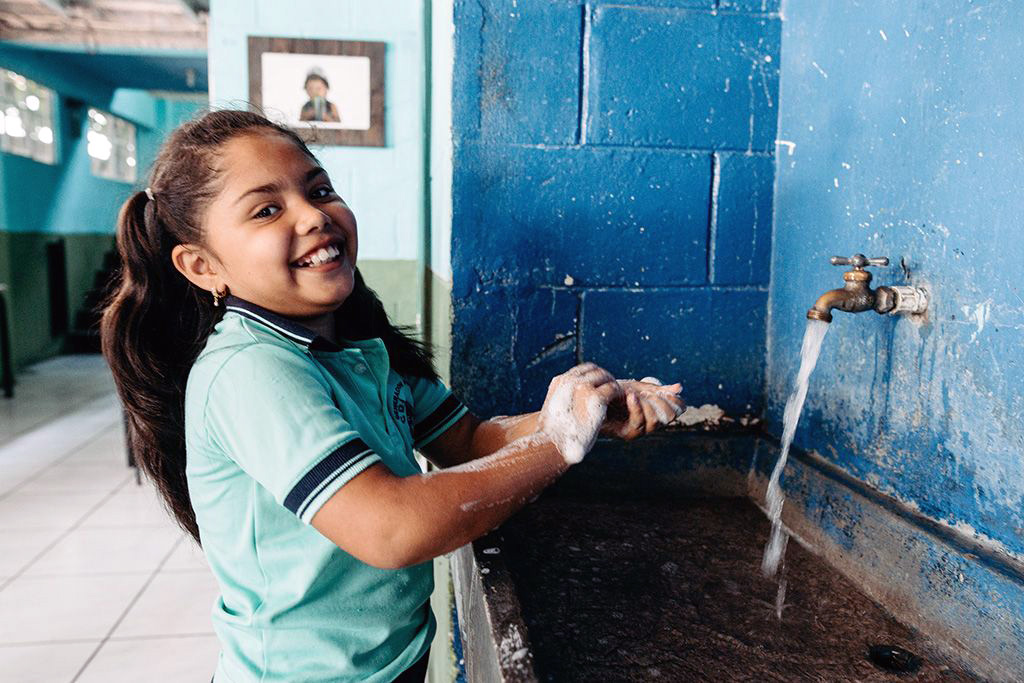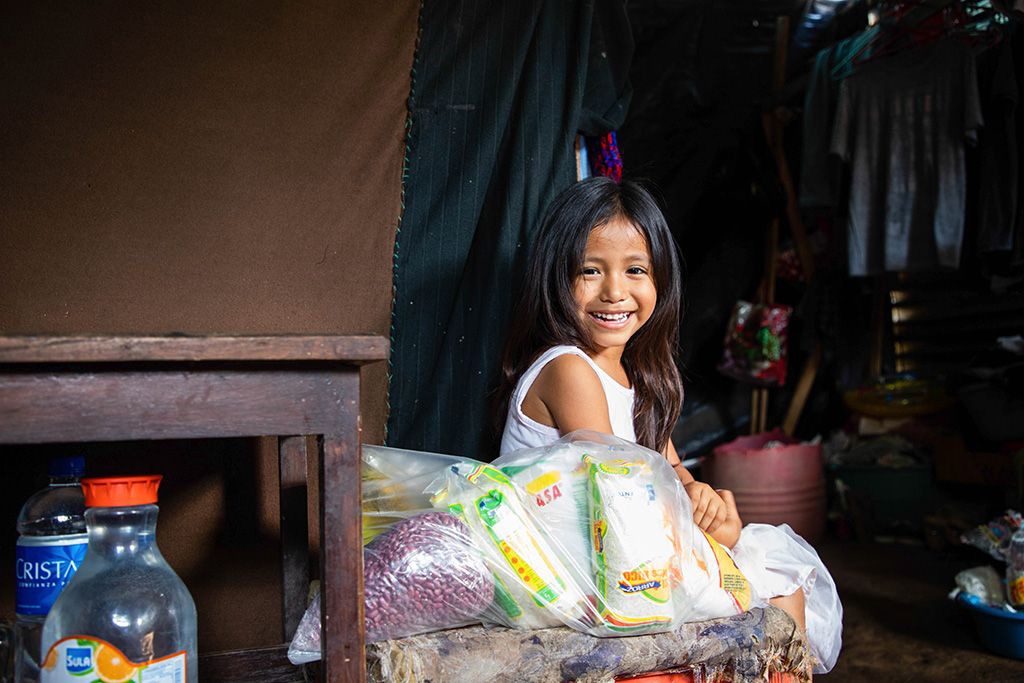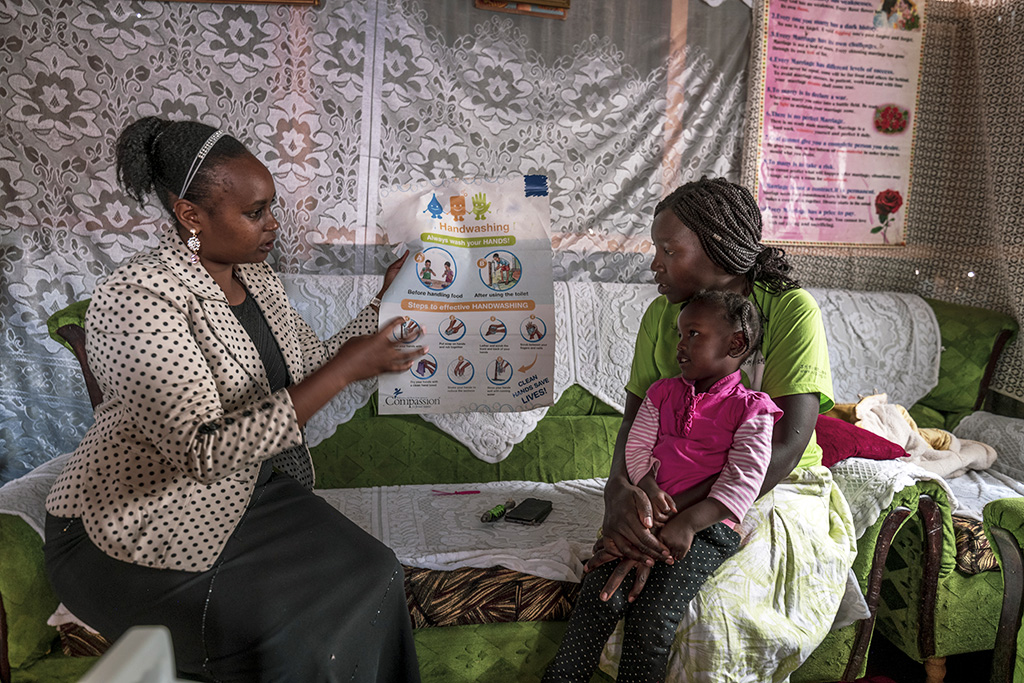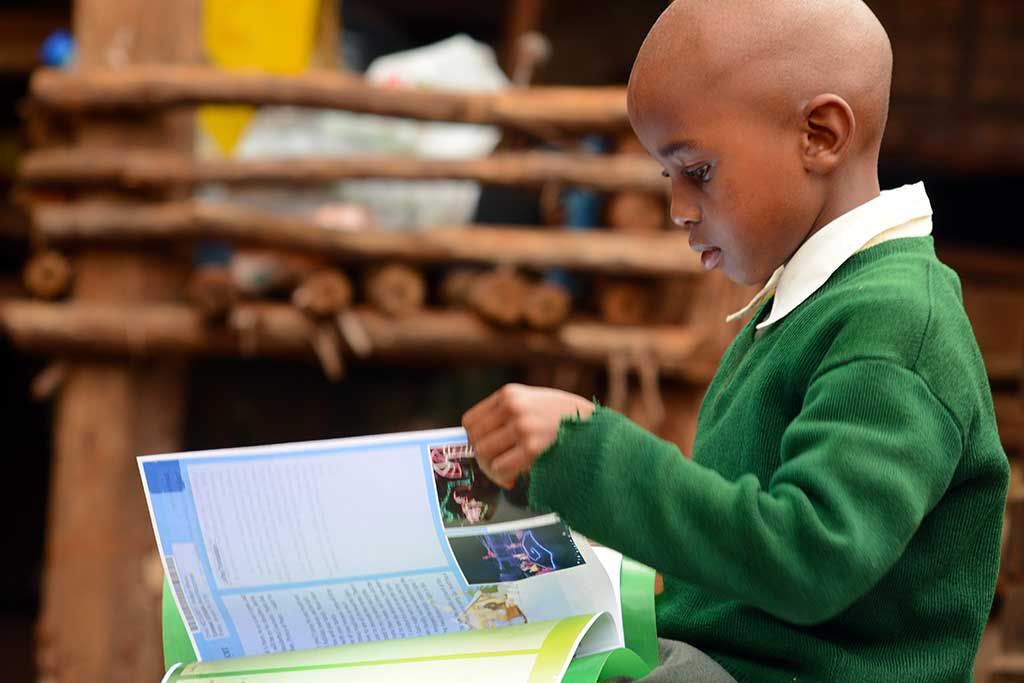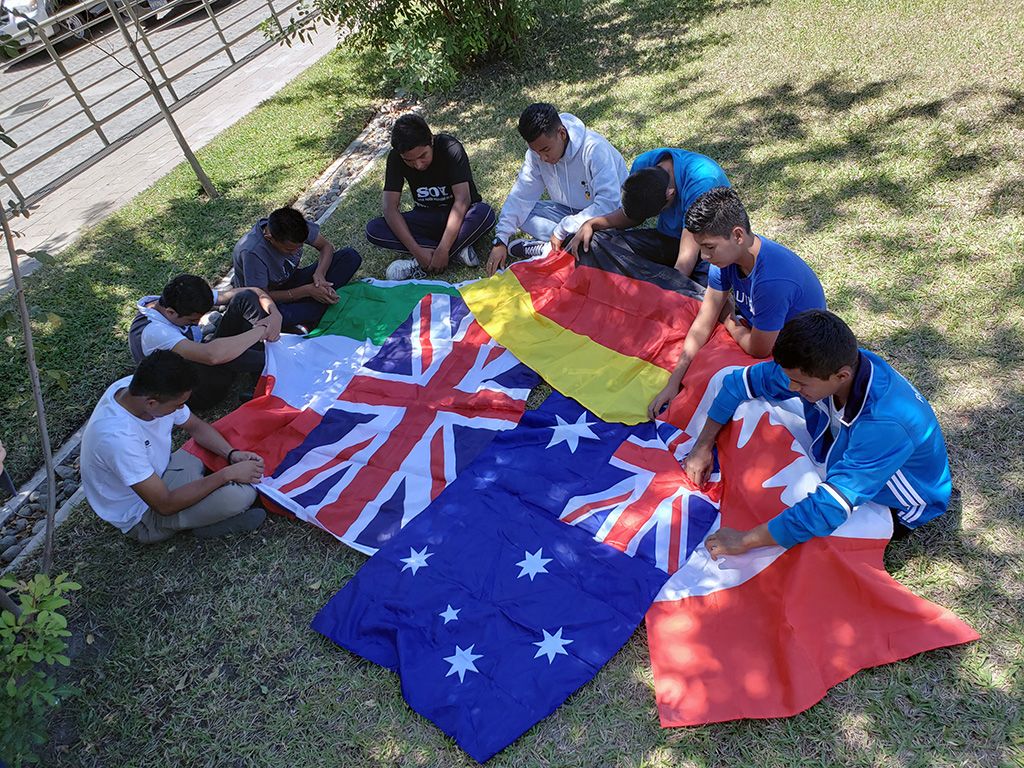The rapid spread of COVID-19 and the strain it’s put on healthcare systems has left many in the countries where Compassion works fearful and anxious for what the virus could mean for them. Health systems can get dangerously overwhelmed in the low-resource settings and the challenges of poverty are only exacerbated during a pandemic like COVID-19.
During this time, we’re so thankful for your ongoing support which is helping our phenomenal church partners around the world deliver essential care to children and their communities in the midst of this global crisis.
To keep you updated on how Compassion is supporting your sponsored child here are the answers to 10 questions you may be asking.
1. What’s being done to look after my sponsored child?
Around the world, Compassion staff and local church partners are working hard to provide support to children and families wherever possible. While many Compassion projects are temporarily closed to group activities, that doesn’t mean all activities have stopped.
In some cases, local church partners are carrying out home visits, phone calls or WhatsApp messages to check on the welfare of children and their families. They have been delivering medical supplies, hygiene kits, extra food, water and other resources to help during this time of crisis. In Honduras, following special permission from the government, our church partners are continuing to deliver daily food packages to 10,800 families in poverty who are currently unable to work due to COVID-19 restrictions.
For Ivis and his grandmother, Renia, the food package which contained 15 days’ worth of supplies came just in time. “Renia broke down in tears when we delivered the groceries,” explains Nifa, a Project Director. “They had just run out of food and had no one to turn to. I was moved to tears as well. If not for Compassion’s rapid response, Ivis and his grandmother would have been left adrift like so many in our country.”
Emilson and his family also received a food package. Witness his joy as he describes the essential items the family were given.
2. Will my sponsored child and their family be provided with prevention training?
Thanks to your generous sponsorship donations, proactive education in hygiene and disease prevention has always been a vital part of the teaching your sponsored child receives at their Compassion project. A pandemic like this one brings even more focus to appropriate hygiene practices to help protect the health of children.
As Edouard Lassegue, the Regional Vice President of the Latin American region explains this is something our local church partners are already prepared for.
“We want to let you know, first, that every church partner has been prepared for some time now on how to face situations like this. Especially in Latin America and the Caribbean, our countries are located in areas prone to natural disasters, either exposed to hurricanes or floods or earthquakes. Now with COVID-19, we have taken steps to equip the country office as well as the church partners on what steps to follow when there is a crisis.
“We have been teaching our young people and our children who are registered in our programme some basic hygiene steps, like washing your hands and washing your hands before you eat, or things of that nature as part of the normal training. Now when it comes to this specific crisis, we have trained and we are training our tutors from our church partners to know the best information to convey to the families and how to help them prepare and prevent contracting that particular disease.”
In the Dominican Republic churches have been distributing leaflets and posters to educate the community about preventing COVID-19.
During home visits and at the project, pastors and church staff taught families how to correctly wash their hands and shared other prevention tips. Some have even connected with their local radio station so the message could reach a broader audience.
“We are impressed by how our churches have responded to this pandemic, says Keilin, a Health Specialist for Compassion Dominican Republic. They have given preventative talks to children and their parents. They have also distributed personal hygiene products, and within their plan, they are supplying food to those families who are most vulnerable.”
3. How is Compassion equipping local communities to cope with COVID-19?
Like the programme your sponsored child participates in at their local church, Compassion’s response to COVID-19 is contextualised to fit the needs of each church partner and their community.
As Silas Balraj, the Regional Vice President of the Asia region explains, “In the case of COVID-19, we have health specialists in every office who have developed health communications and documentation which is provided for our churches in the local language that connects to the local government’s policy and guidelines on when you identify a case, and you see the symptoms of COVID-19, what you should do.”
In El Salvador, where nearly a third of the country’s population lives in poverty, local church partners have been holding educational sessions for children and their parents to teach them how to prevent the virus by maintaining good hygiene.
“The people here are thinking, if the bigger countries are having problems with COVID-19, it would be chaos in our country,” says Rafael, a Compassion Partnership Facilitator. “That’s why it’s important that churches like this are starting training about how to prevent COVID-19 and giving medical kits not just to the children, but to the parents.”
At one Compassion project in Macjula, mothers Elisa and Melani received one of these kits containing hand sanitizer, masks, and Vitamin B supplements.
“They told us in the teaching that we had to wash our hands because bacteria and viruses, not just COVID-19, can get stuck in our hands,” explains Melani, mother to 10-year-old Alexia. “If we have the bacteria or virus on our hands and we touch our eyes or mouth, we can get sick.”
“The public healthcare here is not so good, adds Elisa. “Our children, they have the blessing that they have the clinic here at the church and the Compassion project helps covers most of the costs of the medical care.”
4. How does the travel suspension affect the support my sponsored child receives?
One of the strengths of our programme is that the local church partners directly implement the programme in their local communities. They are uniquely positioned to provide support and don’t depend on our ability to travel in order to ensure children and their families receive the love and care they need.
5. I’ve read that the programme where my sponsored child lives has been suspended, what does that mean for my sponsorship donations?
While projects are temporarily closed to group activities, project staff and volunteers are finding creative ways to support children and deliver the Compassion programme. Your monthly support is vital at this time as COVID-19 has hit those living in poverty the hardest.
To meet critical needs, we’ve made some temporary changes to how your donations are used and distributed so we can respond with context-specific solutions.
Compassion is empowering local churches to redeploy sponsorship funds that are ordinarily used for group activities at the local church, so they can meet the urgent needs of families with children and youth registered in the programme. This includes necessities such as food, clean water, shelter, clothing, household items, and even medical care and trauma counselling.
Please take a few moments to watch this video from Sydney Muisyo, Compassion’s Head of Global Programme to hear more about what this change looks like and how our incredible church partners are adapting.
While the COVID-19 pandemic prevents public gatherings, we plan to empower the local church with this home-based approach to provide a basic level of care and support and to meet critical needs. As soon as children can safely return to attending the local church projects, fund allocation will return to normal. We’ll share this news with you as soon as this happens.
Where possible, local church partners and project staff continue to keep in touch with families through home visits, phone calls, and WhatsApp.
For example in Honduras, Jeffry, a Compassion tutor, has been finding new and innovative ways to share his project lessons now that the country is in lockdown.
“Some of our youths have access to mobile phones,” shares Jeffry, “so I started recording and narrating the Bible lessons. After wrapping up my videos, I send them to the families. For the younger children, I’ve developed handmade visuals and colouring pages which I drop at their houses.”
The communities our church partners serve are facing such great challenges during this season, we’ve also launched a COVID-19 Emergency Appeal to equip them to go further in supporting vulnerable families. Donations to the appeal will enable our church partners to give further emergency hygiene, food and housing support, including to children and families who are not already registered participants in Compassion’s programmes.
5b. I also give to Sponsorship Plus, why can’t these needs be met from the extra funding that I already provide?
When sponsorship donations are used for group activities at the local church project, your money is used very efficiently. When those same funds are used to meet the needs of entire families, in addition to the registered children, the money doesn’t go as far. Right now, both your sponsorship donations and extra donations are needed during this pandemic.
6. Will I know if my sponsored child has COVID-19?
We have now seen confirmed cases of COVID-19 in several of our field countries among Compassion-supported children, their caregivers or family members, or staff of our partner churches. Please join us in lifting all those impacted up in prayer.
To protect the privacy of your sponsored child and their family we treat all health information as sensitive data. As a sponsor you won’t be informed if your child contracts Coronavirus but please be reassured that, as with any medical need, Compassion is equipped to support children and their families. As Edouard Lassegue explains:
“We have in Compassion a way to provide medical assistance to each child who gets sick. The children and their families, they are aware whom to contact if their child, or a parent gets sick. And they know they can go to a medical facility in order to get proper treatment.
“Now, having said this, I also recognise that many of the countries or many of the communities where we minister do not have adequate medical facilities. That’s the reality of the work that we are in. We recognise that because we choose to go to areas where the need is greatest, that is the reality. So that’s why we try to keep in contact with the families so that as soon as there is a situation that would require additional support for a child to be taken to another hospital or facility outside of his community, we want to be ready and informed so that the church knows, as well as the Compassion office in the country, how to make this happen.”
We will be keeping this page updated regularly with the latest news. Your sponsored child may also choose to write to tell you that they’ve been unwell or have a medical condition. If they do, we ask that you treat this information sensitively.
Please keep praying for the protection from the virus for all children registered with Compassion and their families.
7. Does my sponsored child’s community have the resources to cope with COVID-19?
Our staff and church partners are adapting and innovating day-by-day, finding ways to help and assist children and their families. What’s more, funding from our COVID-19 Emergency Appeal will enable our church partners to go even further in providing vital hygiene, food and housing security to the most vulnerable children, families and communities.
In the Dagoretti slum, Kenya, the local Compassion project has been creating awareness of how to minimise the risk of infection from coronavirus. Like many communities where Compassion works, water in Dagoretti can be scarce and expensive. To help protect families, the project is teaching caregivers how to make homemade sanitizers for when handwashing isn’t an option.
“The demand for sanitisers really escalated and so did the prices, says Mary, the Compassion Child Survival Implementer. “We have … taught parents how to make sanitizers so that when water is not available, they can still be safe.”
“The biggest concern project staff have now is if or when a case is reported in the area,” Mary continues. “The houses are crammed up and people densely populated. It would be very difficult to contain the spread.”
Compassion will continue, where it can, to equip local church partners who are responding directly to the needs in their communities. We’re so grateful for these men and women who continue to be the frontline heroes of this ministry. Find out more about how you can support our church partners through our COVID-19 Emergency Appeal.
8. Will my letters and gifts still reach my sponsored child?
During this time communication between you and your sponsored child will inevitably slow down. While we’ll do everything we can to get your letters and gifts to your child as quickly as possible we do expect there to be delays.
If you’re struggling to know what to write, we’ve put together a few tips, including how to ask appropriate questions about COVID-19, how to be sensitive to the situation, how to encourage your sponsored child and how to pray through the season.
Currently all Compassion UK staff are working from home, therefore we’re asking sponsors to send letters and gifts via their myCompassion account or the Compassion UK App.
9. I’m struggling with my sponsorship donations, what can Compassion do to help?
We understand the uncertainty of the current situation and appreciate that a lot of people will be struggling at the moment. If you are experiencing difficulties, please call our friendly team on 01932 836490 or email us at info@compassionuk.org. There are a number of options we can offer and we’d love to discuss how we can best support you.
10. How can I be praying for my sponsored child?
Viruses of this magnitude can affect all of us, and we thank you for praying with us for the children, families, churches, employees and sponsors already affected by this outbreak. Please join us in praying for:
- Protection from the virus for all children registered with Compassion and their families.
- Health and safety for all of our staff in the international and national offices.
- Children longing for a sponsor to be encouraged, loved and cared for during this long wait. Sponsors and their families who have been impacted by the virus.
You can find more Coronavirus prayer resources on the prayer pages of our website. Be encouraged that Compassion-supported children around the world are also praying for you.
Thank you
Thanks to your faithful support, Compassion’s work continues through our incredible church partners around the world even in these uncertain times.
You may also be interested in
